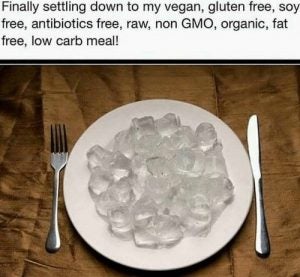For as long as we can remember, dieting trends have always been a thing. From the low-fat craze to the Atkins Diet, South Beach Diet, Weight Watchers, Nutrisystem, etc.
Over the years I’m sure we’ve all seen our fair share of friends or family who have successfully lost weight. It always helps to chat with them as a real life trusted influence when seeking guidance about weight loss, however, sometimes it seems as though too much credit is given to the trendy “diet” name.
For example, a while back I put out a post on social media asking people about their favorite way to lose weight, and the number of different answers made my head spin! Keto? Gluten free? Whole 30? What’s next?

Here’s the deal though. Break it down to what they’re eating and the answer is simple: Cutting calories — replacing high-calorie processed foods with fresh fruits and vegetables is always a good idea. So, can the weight loss be attributed to the fancy trend or diet program/name? Do we really have to give up our favorite foods to lose weight?
The answer could be a big resounding NO. Unless you have a medical reason to avoid certain foods prescribed by your doctor (celiacs, lactose intolerance, allergies, etc.) you really can eat your favorite foods in moderation and lose weight. Calories in, calories out. Eat less, move more.
Recently, I was a panelist at the Strong Process Forum event in Boston. A place where doctors, farmers, fitness enthusiasts, dietitians, and others came together to discuss health and wellness. If there’s one thing I noticed from the experts is that there’s never a “one size fits all” solution. While some people are perfectly comfortable completely cutting one or more food groups or categories (such as carbs, sugar, sodium) that may not work for others. Becoming a vegetarian doesn’t necessarily mean you’ll lose weight, for example. Giving up gluten doesn’t do much for the average person. Food allergies should be taken seriously, but fad diets shouldn’t put people in awkward “trendy” situations that make it harder for people with real life-threatening conditions. When polling registered dietitians on social media, the number one piece of advice or statement they tended to make was, “Is it sustainable?” Meaning, can you keep this program up long term? Will you crash and burn afterwards?
Oftentimes on extreme diets, people may shed a lot of pounds, but after they go off of that plan a majority of that weight comes back. So was it worth it? Perhaps if people focused on “everything in moderation” and replaced processed high-calorie foods with fresh vegetables, we would be much better off. Experts claim a healthy weight loss is between 0.5 to 1 pound per week.
For me, I’ve had the best luck on the Weight Watchers program. It’s been an educational journey for me where nothing is off limits but foods are assigned a “points” value. It’s the most “liveable” program in my opinion, but if I ever decided I wanted to get “cut,” I’d look to the people who have proven their ability to be very lean, like body builders (maybe not so extreme, but you get the idea) or real experts such as dietitians. Ask your doctor but realize that fad diets will always be here. When reading something online, is the source trying to sell you something? Is that person selling it a walking billboard for real results? Are they an expert? Where is the peer-reviewed scientific evidence?
Overall, focus on eating smaller portion sizes while eating more vegetables, fruits, lean proteins, and a little whole grains. Watch those calories! You don’t need to overthink weight loss, and don’t be lured in by trends or false health halos.
Michelle Miller, the Farm Babe, is an Iowa-based farmer, public speaker, and writer, who lives and works with her boyfriend on their farm, which consists of row crops, beef cattle, and sheep. She believes education is key in bridging the gap between farmers and consumers.



